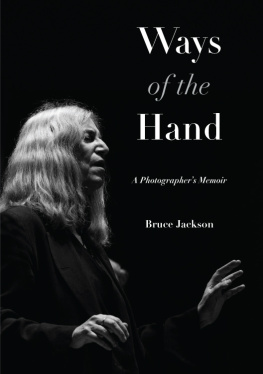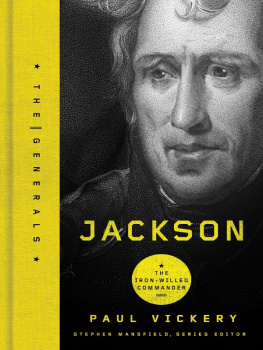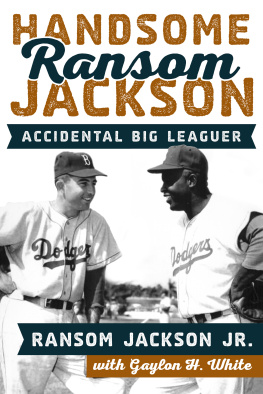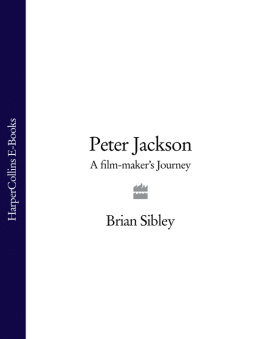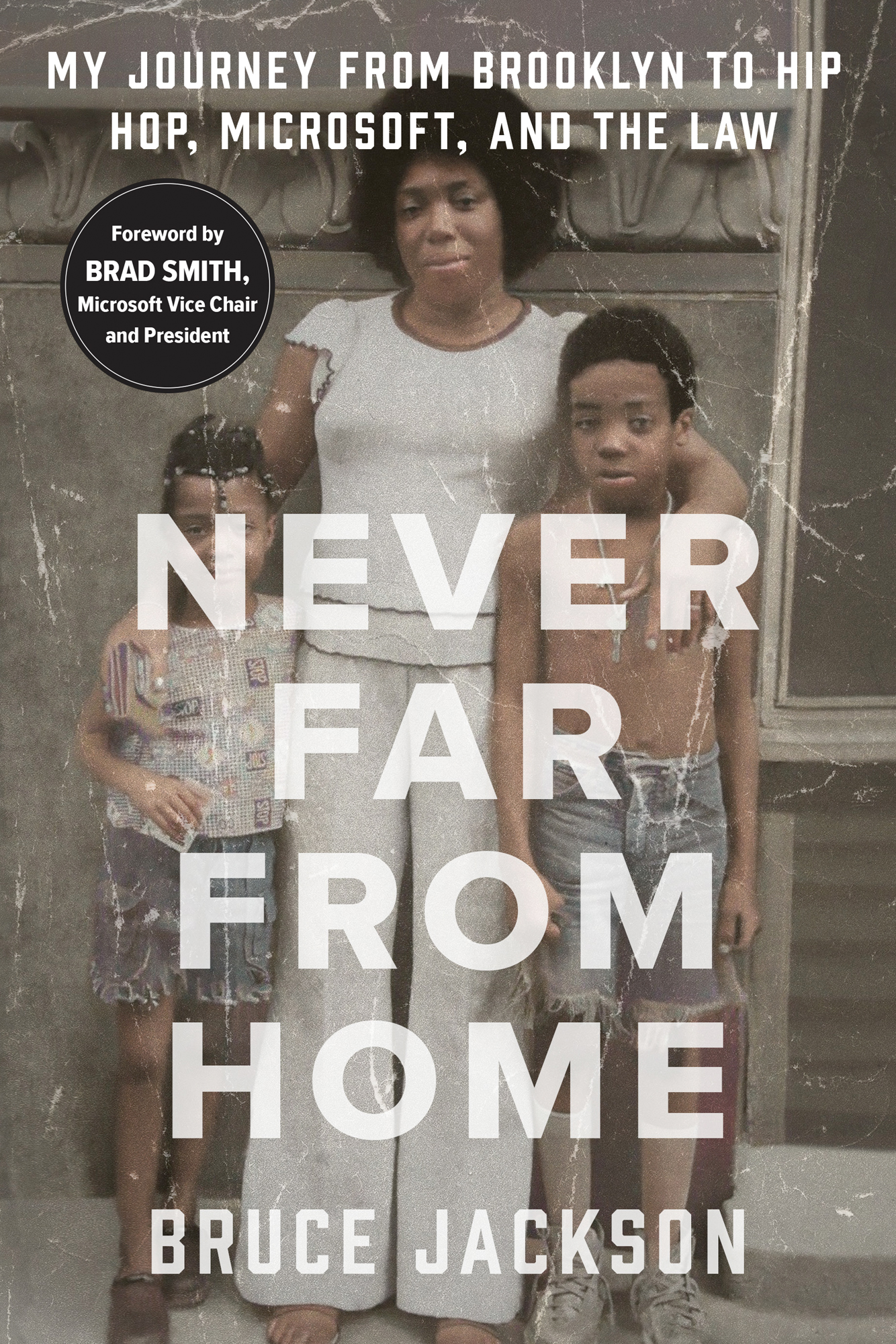Contents
Guide
My Journey from Brooklyn to Hip Hop, Microsoft, and the Law
Foreword by Brad Smith, Microsoft Vice Chair and President
Never Far from Home
Bruce Jackson
To my mother, Flora Mae Miller, my grandmother Mamie Jackson, and my aunt Viola Jackson, for being my inspiration and pushing me harder when I doubted myself.
To my children, Sabree, Maya, Kayla, and Corey, for being my continuous motivation.
To my late aunt Ceola Harvell and the late Ray Spanky Middleton, for their support.
FOREWORD
E ach of us lives a life that presents multiple paths. There are paths we choose to take. There are paths we reject in favor of others. There are paths we dream about that are open to others but not ourselves. And there are paths that we didnt dream possible, but, sometimes and somehow, they become true.
Bruce Jacksons life is a captivating journey that takes all these paths.
Its a life that sheds light on what it was like to grow up poor and Black in New York City. He confronted everyday hardships, including crime on the streets. And one day, at the age of ten, he found himself running from police through a Brooklyn subway station.
Bruce ran not from a crime he had committed, but out of fear after being mistaken in a crowd for someone else. Driven more by terror than thought, his path led him to jump onto the track in front of a subway train, where he managed to hop over the electrified third rail.
The path that is his life story could have ended then and there. But having met Bruce later in his life, Ill always be thankful it did not.
The journey from that subway station to Microsoft, where I first met Bruce, was far from a straight line. In many ways, his journey was different from my own path as I grew up in northeastern Wisconsin. But Bruces life offers many lessons for all of us, regardless of our personal circumstances.
For a time, Bruce followed a path that took him to a part-time clerical job in the basement of the Chase Manhattan Bank in lower Manhattan when he was a high school student. Anyone playing the odds might have bet that Bruce would join the ranks of the other clerical workers who started then and who are still working there decades later. But, as Bruce writes, sometimes its critical to realize what you dont want out of life, which can be almost as important as figuring out what you do want.
Bruces journey involved not just broader ambitions but also a lot of help from others. Never far from home, the intervening wisdom and constant support of his mother, grandmother, and aunt played critical roles in helping him become the first in his family to attend college. But his arrival as a freshman at Hofstra Universitys lush campus was far from a walk in the park. The academics were difficult and the culture daunting. Bruces path almost took a U-turn back to a clerical job in Manhattan.
Bruces journey has involved not just twists and turns, but also ups and downs. His first years at Microsoft speak poignantly to the loneliness of working in Seattle two decades ago at a company that was only beginning to diversify its workforce. He provides powerful insights into what its like to work as a Black professional when almost everyone around you is white.
Our two paths started to connect more closely in 2002, when Bruce decided he wanted to move from Seattle back to the East Coast. I helped him identify a path within Microsofts legal department that would bring him home to New York and into growing success in hammering out complex contracts with the companys largest customers. As he rose to more senior positions, I frequently benefitted from his advice, not only on legal and business issues, but also on what we needed to do to build a more supportive environment for a more diverse workforce.
Despite Bruces success, in multiple ways he has continued to live a life that has lived up to this books title, Never Far from Home. As I learned over the years, he lives this mantra, supporting family and friends, and by playing a growing role in community groups in New York and acting as a mentor for others.
At the same time, part of Bruces journey has involved the continuing and painful prejudices directed at so many Black Americans. I vividly remember the story he recounts in the prologue, which he shared with me after it happened. Despite his years of success, failure to pay a simple parking ticket (incurred by someone else) led to Bruces arrest, when he was put into handcuffs and leg irons and spent a night in jail. I have learned enough to appreciate that Bruces experience that day was far from unique. In that sense, perhaps it wasnt even surprising. But it still felt shockingand it should be for all of us.
Ultimately, Bruces journey is a story of hope born from personal determination. One thing I have appreciated and even loved about Bruce is his constant willingness to be honest and direct. He shares advice even when it is difficult to hear, and always with an eye toward discovering a better solution. He seeks out and spends time sharing the personal details about other people that make it possible to understand more clearly how we can help them succeed.
All of this comes through in the book. The pages turn quickly. Bruces life and story are a source of inspiration. Certainly for me. And I believe they will be for everyone.
Brad Smith
Vice Chair and President
Microsoft Corporation
Prologue NEW YORK, 2010
T he Amsterdam Houses never change. The sprawling housing project comes into view as I make the familiar left turn from Eleventh Avenue onto Sixty-First Street and climb uphill from Manhattans west side. The Houses are a city within a city: nine acres, more than a thousand residents, and countless stories that never see the light of day. The mass of brick towers feels as foreboding as everbad enough for me when I get pulled back for an extended residency every few years, but worse still for my mother, who remains as stuck to this place as the memories of my youth on the edge. This time, Ive been brought back by the twin traumas of an imploding marriage and a house fire that has rendered uninhabitable my home in Mount Vernon, New York.
But this place is home, always will be. To me and countless friends and relatives here and gone, too many now lost to drugs and violence and crime. Yesterday, a Sunday, I broke bread with some of the folks in this neighborhood and joined with them in prayer at Sunday service. Today, my team closed a hundred-million-dollar deal for Microsoft, where Ive worked for more than a decade. We held a party in the office to mark the win. Then I met a friend and drove to the grocery store to pick up a batch of crab legs and some beersfor a celebration party with family and friends.
Some peopleand this is especially true of those who grew up poorlike to dig at their roots until they give way completely, and there is nothing to draw them back. Makes it easier to shape-shift into something else; to blend in at corporate functions or black-tie charity events.
I want to help these people. But dont get the wrong idea. I was never one of them.
Not me, but I get it. If youre uncomfortable with who and what you were, you want to pretend it never happened. But as far as Im concerned, everything Ive accomplished grew from the roots of the city and projects and distressed neighborhoods that raised me. The Houses are no less a part of me than the blood that flows through my veins. Hell, Im proud of it. But I also know it could have turned out like it did for many of my friends: dead or incarcerated. Reality has a way of shaking me awake whenever Im tempted to forget about that fact.


